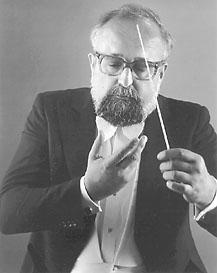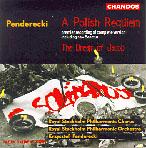Krystof Penderecki Talks about the Polish Requiem by Philip Anson
/ April 1, 1998
Version française...
 Polish composer Krystof Penderecki [pronounced
Pen-der-ET-skee] returns to Montreal on April 8 to conduct the North
American premiere of the complete version (including the recently
composed Sanctus) of his massive Polish Requiem.
Who better to lead the Montreal Symphony Orchestra and Chorus than
the composer himself, who has conducted over 100 performances of his
Requiem around the world? La Scena
Musicale spoke with Maestro Penderecki about the
Polish Requiem last October in New York. Polish composer Krystof Penderecki [pronounced
Pen-der-ET-skee] returns to Montreal on April 8 to conduct the North
American premiere of the complete version (including the recently
composed Sanctus) of his massive Polish Requiem.
Who better to lead the Montreal Symphony Orchestra and Chorus than
the composer himself, who has conducted over 100 performances of his
Requiem around the world? La Scena
Musicale spoke with Maestro Penderecki about the
Polish Requiem last October in New York.
We met in the Oak Room of the Plaza Hotel where the Maestro was
staying with his wife. At 65, Krystof Penderecki looks every inch
the well-tailored Mitteleuropean cultural icon, with heavily
accented speech, white goatee, and an owlish professorial gaze. He
is a charming and well-practiced interviewee, kindly answering
questions he has probably heard a hundred times before.
Penderecki explains that the Polish Requiem was written in
stages over a period of several years, like all of his large
compositions. "That is my method. I always seek the form first. That
is the most important thing. Then I sketch in details, themes,
motifs and development. You can see the complete form better this
way than if you start at the beginning and write through to the
end." Penderecki has no problem maintaining the creative impulse
over months and years. On the contrary, he finds that his
compositions "crystallize" over time.
The Polish Requiem, which Penderecki dedicated to his
country's sufferings, grew from a number of originally unrelated
occasional pieces and commissions. It began back in 1980 when
Solidarity leader Lech Walesa commissioned a piece for the unveiling
of a monument to the victims of the Gdansk uprising. Penderecki
recalls, "Just one month before the unveiling I still had not found
the right text to inspire me. I was conducting in Baden-Baden when I
came across a score of Verdi's Requiem. The Lacrimosa
seemed the perfect text and I wrote it in one month." Was he
influenced by Verdi's music? "Of course not!"
In 1981 Penderecki's friend Cardinal Wyszynski died. "I got the
news in the morning and I wrote the Agnus Dei by that
afternoon." The Dies irae was commissioned in 1984 to commemorate the Polish resistance
to Nazism. And so Penderecki's unorthodox mass for the dead came
into being. He even incorporated an old Polish hymn tune in the
Recordare, Jesu pie, while omitting parts of the
Offertorium and adding a big Finale: Libera Animus
recapitulating all the themes. The optimistic Finale promises
an end to Poland's suffering. "Those were troubled times, times of
change, but we felt that things had to get better," the composer
recalls. The complete Polish Requiem (1984 version) was
premiered by Mstislav Rostropovich in Stuttgart on September 28,
1984, and recorded for Deutsche Grammophon. For the 1993 Penderecki
Festival in Stockholm on the composerís 50th birthday he wrote a new
Sanctus. The 1995 Chandos recording of the complete 1993
Requiem remains definitive. commissioned in 1984 to commemorate the Polish resistance
to Nazism. And so Penderecki's unorthodox mass for the dead came
into being. He even incorporated an old Polish hymn tune in the
Recordare, Jesu pie, while omitting parts of the
Offertorium and adding a big Finale: Libera Animus
recapitulating all the themes. The optimistic Finale promises
an end to Poland's suffering. "Those were troubled times, times of
change, but we felt that things had to get better," the composer
recalls. The complete Polish Requiem (1984 version) was
premiered by Mstislav Rostropovich in Stuttgart on September 28,
1984, and recorded for Deutsche Grammophon. For the 1993 Penderecki
Festival in Stockholm on the composerís 50th birthday he wrote a new
Sanctus. The 1995 Chandos recording of the complete 1993
Requiem remains definitive.
Though born a Roman Catholic, Penderecki wouldn't call his
Requiem religious music. "In the past I have used Hebrew and
Russian Orthodox Church music but my main inspiration is the solid
German 19th century symphonic tradition and Renaissance polyphony."
Despite the historical and patriotic significance of the Polish
Requiem, Penderecki denies it is a political piece. "I don't
write political music. Political music is immediately obsolete. My
Threnody for the Victims of Hiroshima remains important
because it is abstract music. The Requiem is dedicated to
certain people and events, but the music has a broader
significance."
Stylistically the Polish Requiem bears little relation to
Penderecki's wild years of innovation in the 1960s. "My Threnody
is still avantgarde, but the age of experimentation is over. We
discovered everything!"
The Requiem reflects Penderecki's new pluralism. Audiences
will hear passages of pure tonality as well as noisy sound clusters
and polyphonic atonal chromaticism. The score calls for a big
orchestra with quadrupled winds, six horns, heavy percussion, mixed
chorus and four soloists. Penderecki will bring several eastern
European soloists who have sung the Requiem before.
MSO Choirmaster Iwan Edwards, who has never conducted a work by
Penderecki, calls the Requiem one of the most difficult
pieces his choir has ever tackled. "Technically it is very
challenging because of the dissonances, the division of voices and
the rhythm. When the choir members first saw the score they were a
bit unhappy but now they are coming to appreciate it. The
Requiem is frighteningly expressive and emotional but also
melodic and accessible." Penderecki is confident that the Montreal
Symphony Orchestra and Choir are up to the challenge: "I can only
perform my Requiem with a really excellent orchestra and
chorus. From my previous conducting experience in Montreal I know
they are perfectly capable."
Penderecki conducts the Polish Requiem with the
Montreal Symphony Orchestra and Choir, April 8, 1998, at 19h30 at
Notre Dame Basilica ($10,$20,$36). Ticket information: 842-9951.
During the week before this concert, a Polish Music Festival will be
held at the Polish Consulate, 1500 Pine Ave. West, April 2-5.
Concerts on April 3,4,5, with the April 5 performance being graced
by the presence of Penderecki himself. Ticket information at
487-5550.
Version française... | 

